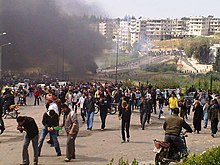
The term Cradle of the Revolution refers to a historically significant location (typically a city or town or an area within one) where a political revolution began. Such cities often bear outsized importance in the national and/or historical narrative of a country, and may be home to a number of national museums and monuments.
The term derives from infant cradles, referring to a revolution being gradually "nursed" from a young age (e.g. small uprising) until it becomes mature (e.g. full-scale revolt and/or civil war).
Examples
- Bastille, Paris, France - Cradle of the French Revolution (see Storming of the Bastille)
- Boston, Massachusetts and Philadelphia, Pennsylvania - Cradles of the American Revolution (see Faneuil Hall, AKA the "Cradle of Liberty")
- Daraa, Syria - Cradle of the Syrian revolution
- Petrograd, Russian Empire - Cradle of the Russian Revolution
- Sidi Bouzid, Tunisia - Cradle of the Tunisian revolution
- Timișoara, Romania - Cradle of the Romanian revolution
References
- "Daraa province: cradle of Syrian revolt". Arab News. 2018-04-25. Retrieved 2024-12-18.
- "Focus - Sidi Bouzid: Cradle and grave of Tunisia's revolution?". France 24. 2015-12-17. Retrieved 2024-12-18.
- "Revisited - Romania's Timisoara, economic hub and cradle of the 1989 revolution". France 24. 2019-11-29. Retrieved 2024-12-18.
| This article needs additional or more specific categories. Please help out by adding categories to it so that it can be listed with similar articles. (December 2024) |